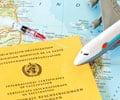During COVID-19 pandemic, experts have underlined the need for continuing the polio immunization programme to help maintain India's polio-free status.

‘Since March 2020, the COVID-19 pandemic has disrupted life-saving immunization endeavors around the world, putting millions of children at risk of diseases like polio, diphtheria, and measles. ’





This may significantly decrease the immunity level of the population against polio, said Dr. Preethi Sharma, Consultant Pediatrician, KIMS Cuddles, Kondapur. "Most hospitals have a separate outpatient department for any fever or Covid suspect cases and the immunisation area allows entry of only healthy babies/children. The parents need to be assured that the risk of Covid transmission during vaccination is almost negligible but missing the vaccine can definitely increase the child's risk of getting infected with vaccine-preventable diseases, including polio," she said.
In order to successfully eradicate polio, parents should get their child immunised with OPV and IPV and also continue to get the vaccine administered during government polio drives. Both vaccines are very safe and their use should be continued. Government should have campaigns to strengthen the immunisation drive.
After an uphill battle and multiple doses of oral polio vaccine, India was declared polio free (wild polio virus) in March 2014. This was a huge accomplishment as India was considered one of the most challenging countries.
"Though India is a wild poliovirus disease-free country currently, the cases of Vaccine Derived Polio Virus (VDPV) disease can be seen. The emergence of VDPV disease is a known risk of OPV (oral polio vaccine) vaccination, where the weakened live virus given as vaccine in OPV starts becoming virulent and thus gives rise to the disease in a few children among the lakhs that were vaccinated with it."
Advertisement
Until all the children in the country are not vaccinated with IPV, the risk of polio resurgence either due to importations from neighbouring Pakistan and Afghanistan, the only two polio-endemic countries in the world now, or from VDPV will be there, the doctor said.
Advertisement
The government has already removed type 2 containing OPV (the trivalent OPV to bivalent OPV switch). The reason being the type 2 component contained in trivalent OPV accounts for more than 90 per cent of all vaccine derived polio virus cases (bivalent OPV does not contain type 2).
"Year after year, and generation after generation, the government of India and the people here have taken a mission route with the vision to eradicate the deadly polio. Administering polio drops to newborn babies was a small yet most effective means to tackling the spread of poliovirus. And it is the same commitment that is needed in these COVID-19 times to put an end to the deadly coronavirus.
"Not letting the guard down is the only way to overcome the present crisis. People must believe that following prescribed restrictions and ensuring safety norms is the only way we can come out of the problem," said Dr. Ravindra Parigi, Consultant Neonatologist at Medicover Hospitals, Visakhapatnam.
On World Polio Day 2020, it is important to look at the learnings India and the world can take from the past efforts to overcome the current Covid-19 crisis. Though polio still exists in underdeveloped nations like Pakistan and Afghanistan, the instances have decreased by over 99 per cent in comparison with the 1980s, he added.
Source-IANS












